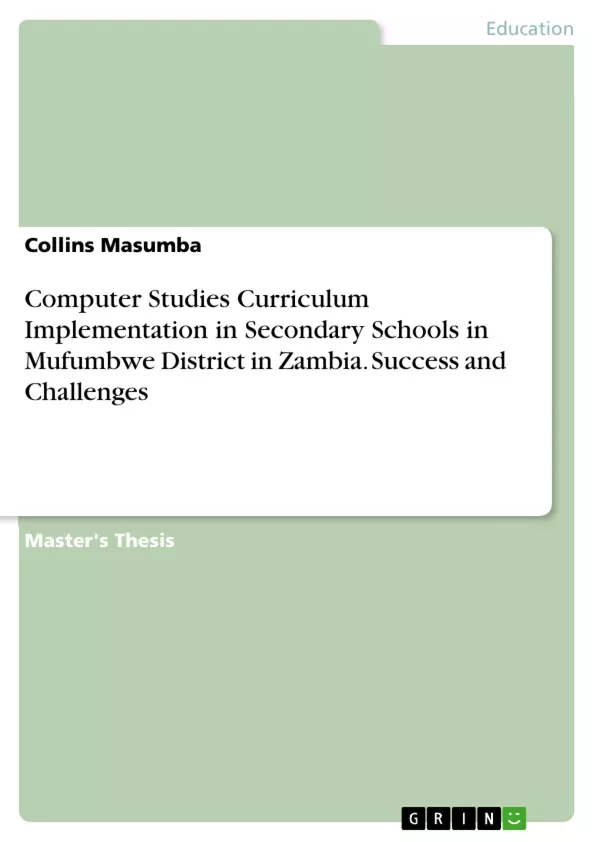The purpose of this study was to investigate the Computer Studies Curriculum implementation in rural secondary schools of Zambia’s Mufumbwe district. This study was guided by the following questions: What facilities and equipment are available for the implementation of the Computer Studies Curriculum in selected secondary schools of Mufumbwe district? Are there enough qualified teachers to enhance the effective implementation of the Computer Studies Curriculum? How appropriate are the teaching methodologies in the implementation of the Computer Studies Curriculum? What are the head teachers’, teachers’, learners’ and parents’ views on the teaching of Computer Studies?
Globalisation and technological development in the world have accelerated and created a new global economy fuelled by information and driven by innovations. One way in which information spreads is by the use of computers. In the 2013 revised curriculum, the Ministry of General Education in Zambia introduced Computer Studies into the education system. The few studies in this area were done in urban areas. The rural setting has been ignored as regards to implementation of Computer Studies Curriculum. Mufumbwe district being a rural setting is a special case especially in a Zambian context considering development trends in Zambia. Specifically, the study sought to establish the availability of facilities and equipment for the implementation of Computer Studies, find out the availability of qualified Computer Studies teachers, examine the appropriateness of teaching methods and establish the views of Head Teachers, teachers, learners and parents on the implementation of Computer Studies in Secondary Schools in Mufumbwe district.
Lack of computer skills among learners in Zambia may hinder technological advancement and fail to achieve the national ICT policy goal of 2007 which introduced CS as an enabler in a diversified and export-oriented economy, capable to improve livelihoods and protect the vulnerable through service delivery and provide an efficient and effective public sector. Further, Zambia may fail to achieve the vision 2030 whose vision is to have a prosperous middle-income nation through having a technologically proficient, fully able to adapt, innovate and invest using its human and natural resources. It was therefore important that this study was conducted in order to investigate how CSC was being implemented in rural secondary schools in Mufumbwe district.
Table of Contents
- Abstract
- Dedication
- Acknowledgements
Objectives and Key Themes
This dissertation aims to investigate the successes and challenges in implementing the Computer Studies curriculum in selected secondary schools within the Mufumbwe District of Zambia. The study focuses on a rural setting, a context often overlooked in similar research. The research explores the availability of resources, teacher qualifications, teaching methodologies, and the perspectives of various stakeholders (head teachers, teachers, learners, and parents) on the curriculum's implementation.
- Availability of Computer Studies facilities and equipment in rural schools.
- Qualifications and training of Computer Studies teachers in the Mufumbwe District.
- Effectiveness of teaching methodologies employed in Computer Studies classes.
- Perspectives of stakeholders (head teachers, teachers, learners, and parents) regarding the Computer Studies curriculum.
- Comparison of rural and urban implementation of the Computer Studies curriculum in Zambia.
Chapter Summaries
Abstract: This section provides a concise overview of the dissertation, highlighting the research problem, methodology, findings, and conclusions. The abstract emphasizes the lack of research on Computer Studies curriculum implementation in rural Zambia, particularly in Mufumbwe District, and its significance in understanding the challenges and successes of integrating technology into education in developing contexts. It summarizes the key findings regarding insufficient resources, unqualified teachers, and inappropriate teaching methods, while noting the positive overall perception of the curriculum by stakeholders.
Keywords
Computer Studies Curriculum, Zambia, Mufumbwe District, Rural Education, Technology Integration, Teacher Training, Educational Resources, Teaching Methodologies, Stakeholder Perspectives, Innovations.
Frequently Asked Questions: A Comprehensive Language Preview
What is the main focus of this dissertation?
This dissertation investigates the successes and challenges of implementing the Computer Studies curriculum in selected secondary schools within the rural Mufumbwe District of Zambia. It focuses on a context often overlooked in similar research: a rural setting.
What are the key themes explored in the research?
The research explores several key themes, including the availability of resources (computers and equipment), teacher qualifications and training, the effectiveness of teaching methodologies used, and the perspectives of various stakeholders (head teachers, teachers, students, and parents) on the curriculum's implementation. A comparison between rural and urban implementation is also made.
What specific aspects of resource availability are examined?
The research examines the availability of Computer Studies facilities and equipment specifically in rural schools within the Mufumbwe District.
What aspects of teacher qualifications are covered?
The study investigates the qualifications and training of Computer Studies teachers in the Mufumbwe District.
How are teaching methodologies evaluated?
The research assesses the effectiveness of the teaching methodologies employed in Computer Studies classes.
Whose perspectives are included in the research?
The perspectives of multiple stakeholders are included: head teachers, teachers, students (learners), and parents.
What is included in the chapter summaries?
The chapter summaries provide an overview of the entire dissertation, including the research problem, methodology, findings, and conclusions. The abstract specifically emphasizes the lack of prior research on this topic and its significance for understanding technology integration in developing contexts.
What are the key words associated with this research?
Key words include: Computer Studies Curriculum, Zambia, Mufumbwe District, Rural Education, Technology Integration, Teacher Training, Educational Resources, Teaching Methodologies, Stakeholder Perspectives, and Innovations.
What is the overall aim of this dissertation?
The overall aim is to provide a comprehensive understanding of the complexities involved in implementing a Computer Studies curriculum in a rural Zambian context, highlighting both successes and challenges.
What does the table of contents include?
The table of contents includes an abstract, dedication, and acknowledgements.
- Arbeit zitieren
- Collins Masumba (Autor:in), 2019, Computer Studies Curriculum Implementation in Secondary Schools in Mufumbwe District in Zambia. Success and Challenges, München, GRIN Verlag, https://www.grin.com/document/495971



